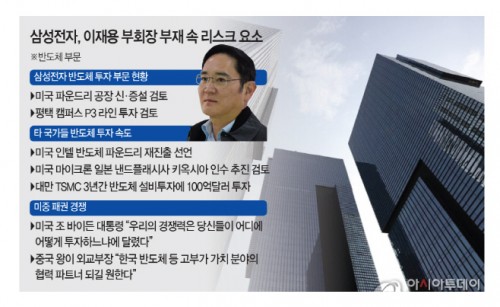 |
AsiaToday reporters Jeong Dan-bi
As competition between the United States and China in semiconductor innovation is intensifying, calls are growing among business, religious and political communities for the government to grant a pardon to jailed Samsung Vice Chairman Lee Jae-yong. There are concerns that Lee’s absence may make the South Korean semiconductor industry lag behind in the rapidly changing global chip market.
South Korea’s five major business lobby groups – the Korea Chamber of Commerce and Industry, the Korea Enterprise Federation, the Korea Federation of SMEs, the Korea International Trade Association and the Federation of Middle Market Enterprises of Korea – plan to present a pardon recommendation letter for Lee to the government within this week, the sources said Monday. As they plan to convey their intention to President Moon Jae-in, they plan to deliver the proposal to the presidential office. “With our economy going through difficult times and the competition for the global semiconductor market heating up, the pardon of Vice Chairman Lee is increasingly necessary,” a draft version of the letter read.
Calls for Lee’s release is not only growing among the business community, but also all levels of society. On April 12, the head monks of the 25 branch temples of the country’s largest Buddhist sect, the Jogye Order, pleaded with President Moon Jae-in to give Lee a second chance. The conservative patriotic Catholic For Korea issued a statement on April 21 calling for Lee’s release.
There are voices from political circles asking to pardon Lee. Yang Hyang-ja, a lawmaker of the ruling Democratic Party (DP) and a former semiconductor executive at Samsung Electronics, said, “Amid the semiconductor battle, the government’s policies are divided by department, and our representative company is fighting in the war without a leader.” Local governments, including Gijang-gun of Busan, Hadong-gun of Gyeongsangnam-do Province, and mayor of Pyeongtaek, also participated in Lee’s release campaign.
One of the major reasons for the growing calls for pardoning Lee is because of the sense of crisis in the chip industry. Currently, major countries are actively competing for investment to preoccupy the semiconductor market. If Samsung fails to respond swiftly to the rapidly changing market due to Lee’s absence, its leading position in the global chip market could be threatened. It means that the semiconductor industry itself, which is the backbone of the Korean economy, can be shaken.
In fact, U.S.-based Intel re-entered the foundry business, and U.S.-based Micron is known to be considering acquiring Japanese NAND flash company Kioxia. Taiwan’s TSMC revealed an aggressive investment plan of $100 billion over the next three years to increase semiconductor output. While Samsung has not come up with detailed investment plans, its competitors are accelerating their investment and support in the semiconductor sector.
“When the late Samsung Chairman Lee Kun-hee returned to work in 2010, Samsung Electronics announced five high-growth businesses including solar cells, LED technologies, rechargeable batteries for vehicles, medical devices, and bio-pharmaceuticals. But the tech giant failed to succeed in LED and solar cell business. It is the result of delayed decision-making process on investment and support due to Lee Kun-hee’s two-year hiatus,” a business official said. “Lee Jae-yong’s absence could also be a starting point for missing the timing for enhancing competitiveness.”
Samsung Electronics is on the edge of making a crucial decision amid fierce competition between the US and China for semiconductor hegemony. Recently, US President Joe Biden urged global companies including Samsung Electronics for active investment in the United States. Recently, China’s Foreign Minister Wang Yi also sent a signal that China wants South Korea to be its cooperative partner in the semiconductor and other fields.
#Samsung Electronics #Lee Jae-yong #pardon
Copyright by Asiatoday
Most Read
-
1
-
2
-
3
-
4
-
5
-
6
-
7





















